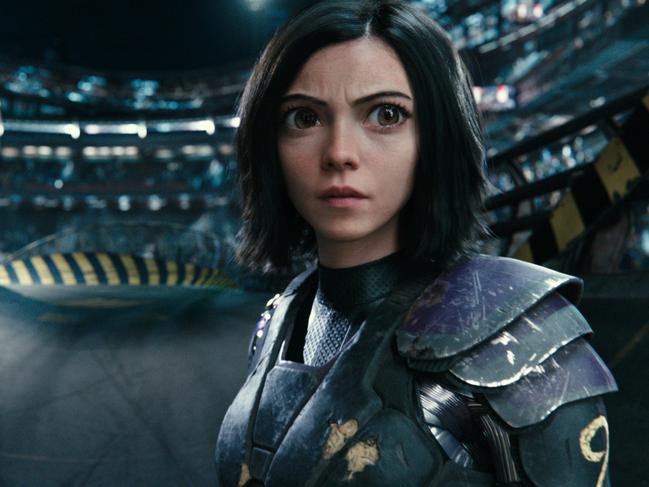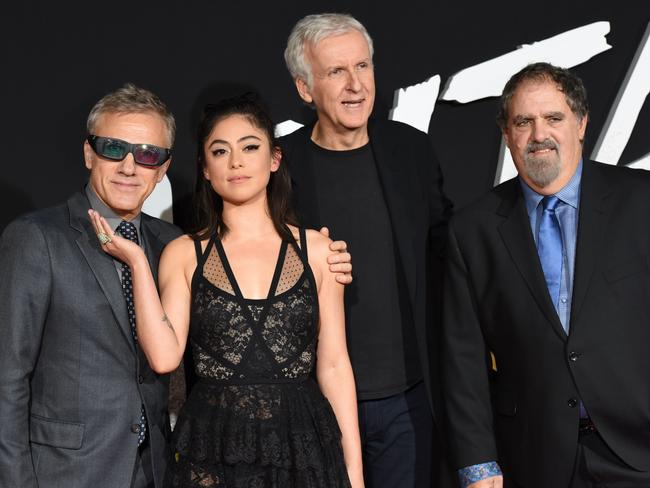Rosa Salazar joins an honoured society of badass women in James Cameron’s Alita: Battle Angel
Rosa Salazar follows in the footsteps of Sigourney Weaver and Linda Hamilton in James Cameron’s Alita: Battle Angel. Here’s what she thinks about joining the movie-making giant’s “honoured society of badass, dynamic, female protagonists”.

Movies
Don't miss out on the headlines from Movies. Followed categories will be added to My News.
Movie-making giant James Cameron has fair track record when it comes to creating action heroines.
Before coming up with the two biggest box office hits of all time in Avatar and Titanic, the writer-producer-director helped rewrote the playbook for action leads in his sequels to Ridley Scott’s Alien and his own Terminator. The brave, resourceful, gun-toting, never-say-die Ellen Ripley and Sarah Connor became cultural touchstones that blazed a path for action heroines to come.
REVIEW — ALITA: BATTLE ANGEL IS PURE POPCORN
YOUR ULTIMATE SUMMER MOVIE GUIDE
JAMES CAMERON WANTS TO MAKE MORE TERMINATOR FILMS
It’s little wonder then that Rosa Salazar felt she had some serious shoes to fill as the title character in Cameron’s long-time passion product Alita: Battle Angel, in which she plays an amnesiac cyborg whose subconscious fighting abilities slowly return along with her memories as she navigates life in a gritty, divided post-Apocalyptic world where resources are scarce and life is cheap.
“It’s been quite an honour,” says Salazar, best known until now for her supporting roles in the Divergent and Maze Runner franchises as well as the recent Netflix hit, Bird Box.
“Even just getting the role I felt like I was being inducted into some kind of honoured society of badass, dynamic, female protagonists.”
Cameron has been working on the film for close to 20 years since colleague and friend Guillermo Del Toro turned him on to the original Japanese manga series created by Yukito Kishiro in 1990. Despairing of ever directing it himself, with all his attention focused on helming his four Avatar sequels and producing a fresh Terminator trilogy, Cameron handed his baby over to like-minded maverick Robert Rodriguez (Spy Kids, Sin City, From Dusk Til Dawn), while retaining a writing and producing credit. For Salazar, who counts Cameron’s Titanic and Rodriguez’s Desperado in her top ten films, it was a dream combination and like having “two dads”.

“James Cameron and Robert Rodriguez seem to always have a very capable, multifaceted heroine as the focal point of their movies so I felt honoured just to be among them,” she says. “Seeing them work together was a really beautiful thing — you would suspect that two titans of filmmaking would have some sort of ego — but there was none of that. It was pure joy of filmmaking and they really inspire each other and the result is what you see.”
After endless casting calls, both Cameron and Rodriguez were equally taken with their leading lady, confident she could step up and bear the weight of a $200 million blockbuster squarely on her shoulders.
“It’s almost impossible to quantify just how big the reaction was that Robert and I had to Rosa,” says Cameron. “She brought such heart and vitality to every moment. I’ve never seen anything like it.”
Although most of Salazar’s scenes playing the lithe, agile, wide-eyed fighting machine Alita were shot using motion capture performance — and stunt doubles were used for some of the many extreme scenes — the Canadian-born Cuban-American actor still trained for months, studying martial arts for the spectacularly choreographed fights and inline skating for the chaotic, gladiatorial sport of the future, Motorball.
“The training almost killed me,” she admits. “I had to get my endurance way up, build lots of strength and start to think like a regimented warrior. A lot of it was learning the forms, harnessing that energy and rhythm.”
The ever-thorough, technically-minded Cameron set the fictional, CG-created Iron City — and the elite enclave Zalem that is suspended above it — in Panama for legitimate scientific reasons. While that also played to Mexican-American Rodriguez’s own Latin flair, Salazar says that although she’s proud to be a Latina actor headlining such a huge film, she’s even prouder that wasn’t the reason she was cast.

“It feels wonderful and it’s high time — it really is,” she says. “Usually with a Latin person that’s half of the thing they want you to lend to the role. And in this case, I was just the best person for the job and I really loved that.”
But she says that having grown up watching — and relating to — male, caucasian action heroes, it’s important that people like her are seen in similar roles because it “broadens the perspective for everyone”.
“It’s important because it takes all kinds to tell stories and it widens the array of stories that we can tell,” she says. “It’s important for representation to show young Latin girls that ‘this is a viable career opportunity and career choice for me — if she can do that, I can do that’. It changes the game and it changes the narrative in terms of what they can offer the world if they can see themselves up there, then they can be up there. It’s important to break down the walls of prejudice and we can do that through art.”
Having publicly questioned the wisdom of the planned wall between the US and Mexico, Salazar also agrees that Alita’s themes of an ever-widening gulf between the rich and the poor and physical barriers separating the haves from the have-nots ring especially true right now.
“Sci fi gives us a chance to reflect back in sometimes fantastical ways on our current status and the current dilemmas of the world and, politically, this could not be more representative” she says. ”You have the clean elite who live in a sky city and you have the disenfranchised who scrape by in the dire circumstance of Iron City. You have a game called Motorball that is designed to distract the masses and to keep them in poverty. So there are a lot of allegories at play here.”
“It is important to see a young, diminutive character take on that dilemma head first and I think that the message is that if we empower ourselves, then we might find that there is a hero inside of us, a hero that is capable of unfathomable power that would enable us to change the world and our circumstances and the circumstances of other people.”
Alita: Battle Angel opens Thursday, February 14.
Originally published as Rosa Salazar joins an honoured society of badass women in James Cameron’s Alita: Battle Angel


